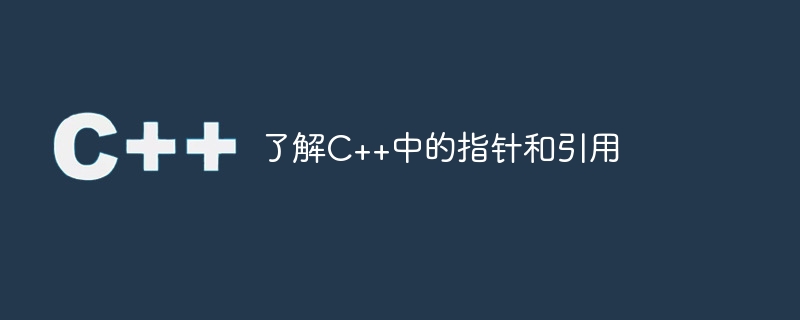

C is a widely used programming language that supports various programming paradigms, including object-oriented, generic, and procedural programming. In C, pointers and references are two very important features that affect the performance and maintainability of C programs. This article will introduce and discuss pointers and references in C.
1. Pointer
A pointer is a basic concept in C. It is a variable that stores the address of a variable. The type of a pointer is determined based on the type of variable pointed to. For example, for an integer variable int a, you can use the pointer intp to store the address of a. Indirect access to variables can be achieved using pointers, that is, the value of the variable can be manipulated through the pointer. For example, use p to get or modify the value of a.
The most common use of pointers is to allocate and manage memory in C programs. Pointers can be used to dynamically allocate memory, including using the new and delete operators. For example, you can allocate a pointer to type int using the following code:
int* p = new int;
This will allocate a memory block of type int and return its address. We can use this memory block through pointer p.
Pointers can also be used for function calls in C, especially for functions that return multiple values. Pointers can be used to return multiple values. For example, the following function will return two integer values using pointers q and r:
void swap(int a, int b, int q, int r )
{
*q = b; *r = a;
}
2. Reference
Reference is another basic concept in C. It is an alias that can bind the name of a variable to fixed to another variable. References are defined in C through the & operator. For example, you can define a reference to type int using the following code:
int a = 10;
int& r = a;
This will create a reference r of type int whose The value is the same as variable a. At this point, the reference r can also be used to access the value of a.
References are usually used in function calls, allowing the function to modify the value of a variable by passing an alias. Since the reference is an alias, the function's modification of the reference is actually a modification of the original variable. For example, the following function can accept an integer reference as a parameter and double its value:
void doubleValue(int& x)
{
x *= 2;
}
in C , references are a very useful feature because they improve the readability and safety of C programs while avoiding the complexity of pointer operations.
3. The difference between pointers and references
Pointers and references are both important programming features in C, but there are some differences between them. First, a pointer can be assigned a NULL value, that is, points to a null address, but a reference cannot. Second, a pointer can be reallocated to another address, whereas a reference cannot. Third, a pointer can point to an array or function, a reference cannot. Fourth, pointers can perform arithmetic operations, references cannot. Fifth, pointers can be passed as function parameters, but references cannot be passed as the address of function parameters. These differences are very real in programming.
4. Summary
This article introduces the important features pointers and references in C, and discusses their characteristics, applications and differences. By understanding pointers and references, we can use the C language more effectively to write efficient, maintainable programs.
The above is the detailed content of Understanding pointers and references in C++. For more information, please follow other related articles on the PHP Chinese website!
 What are the differences between c++ and c language
What are the differences between c++ and c language
 Recommended learning order for c++ and python
Recommended learning order for c++ and python
 Cost-effectiveness analysis of learning python and c++
Cost-effectiveness analysis of learning python and c++
 Is c language the same as c++?
Is c language the same as c++?
 Which is better to learn first, c language or c++?
Which is better to learn first, c language or c++?
 The difference and connection between c language and c++
The difference and connection between c language and c++
 C++ software Chinese change tutorial
C++ software Chinese change tutorial
 Cost-effectiveness analysis of learning python, java and c++
Cost-effectiveness analysis of learning python, java and c++




